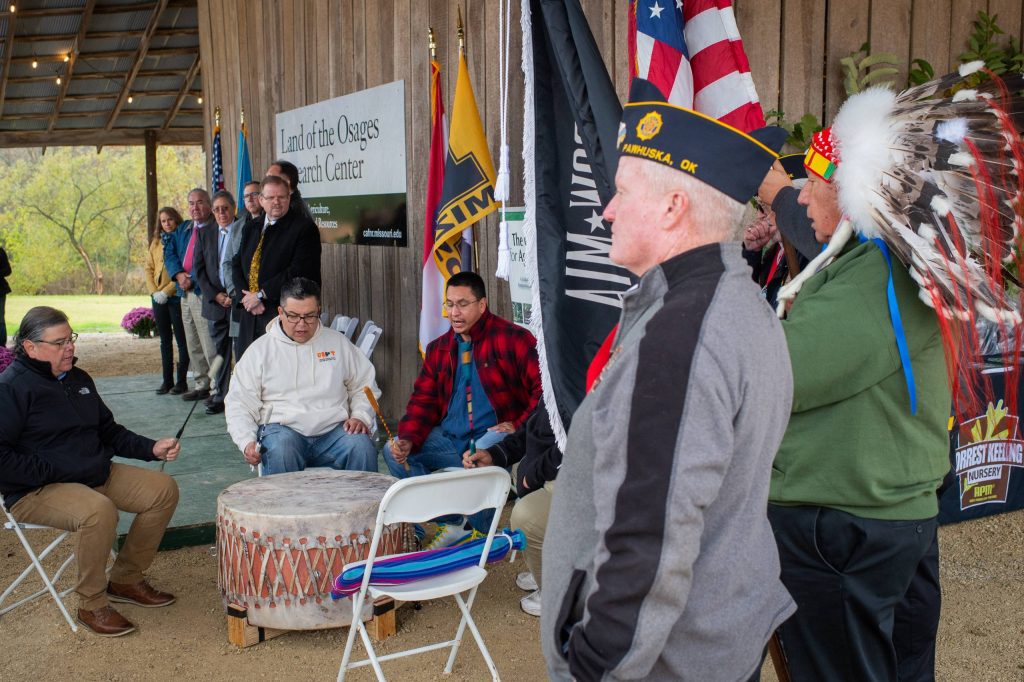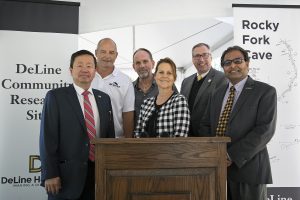Published on
Updated on

This story appears in our MU CAFNR/Agricultural Experiment Station Research Magazine.
A major focus of the Missouri Agricultural Experiment Station (MOAES) has been finding unique collaborations and partnerships to take research projects to the next level. Those partnerships come in many forms – and seeking out collaborations of all types is a primary goal of the newly restructured MOAES.
“We can do great things on our own, but we can make it better if we find the right partner,” said Shibu Jose, CAFNR associate dean for research and director of the MOAES. “It’s important for us to develop that synergy with groups and individuals outside of academia, too.”
Two of the more unique partnerships have happened within the past three years. CAFNR opened the Land of the Osages Research Farm, now part of the Central Missouri REEC, in late 2019, and has partnered with the Osage Nation to develop research projects and training opportunities focused on traditional ecological knowledge and its potential applications in modern agriculture and agroforestry. CAFNR partnered with DeLine Holdings to open the DeLine Community Research Site in 2021, a collaboration focused on developing outdoor research and educational opportunities to facilitate a better understanding of natural ecosystems and processes.
“Both of these partnerships are incredibly important, not only for the research opportunities that have been created, but for the relationships that we have developed,” Jose said.
The more than 500 acres that make up the Land of the Osages Research Farm, located on the western edge of the Lake of the Ozarks, were an estate gift from Doug Allen, who also established MU’s H.E. Garrett Endowed Chair Professorship in 2006 and passed away in 2017. Jose was the first H.E. Garrett Endowed Chair Professor and held the position from 2009-17. The farm furthers research in agroforestry, a sustainability-focused system that combines trees and shrubs with crops – and sometimes livestock – to be managed on the same piece of land as a single ecosystem.

Plans for the site include demonstration trials, internship opportunities and workshops to train local communities in agroforestry practices, all made possible through an endowment created by Allen.
“Doug wanted to recognize a former Osage chief who had lived in the area and was focused on building a relationship with the Osage Nation,” said Dusty Walter, director of Central Missouri REEC. “We’re excited to continue and build on his vision.”
“We’re so thankful for Doug’s willingness to pave the way for this center to become a reality,” said Sarah Lovell, faculty manager of the site. Lovell is the current H.E. Garrett Endowed Chair Professor. “His gift allows us to further our already strong agroforestry programs and research, as well as build collaborations with the Osage Nation.”
The DeLine Community Research Site, a public-private collaboration that the Central Missouri REEC oversees, has been loaned to the University of Missouri for a period of 15 years. The site, which is owned by DeLine Holdings, is nearly 100 acres, and includes a cave, forested areas and a creek.
Initial research and educational opportunities will include the impact of land use on water quality; tree improvement and sustainable forest management; sustainable food processing using native fruits like pawpaw seen abundantly in these forests; and positive health benefits from engagement with nature. Students in the School of Natural Resources use the site as an outdoor classroom, and there are plans to partner with local school districts for similar educational connections.
“With the close proximity of the property to the University of Missouri campus and elementary, middle and high schools, the opportunities for research, education and outreach are endless,” Jose said. “Hands-on learning opportunities are vital to what we do in CAFNR. We are thrilled for this opportunity to partner with DeLine to bring these opportunities to the college and the community.”
In addition to the new, unique partnerships, CAFNR has a long history of partnering with commodity groups in a variety of ways.
For example, CAFNR works closely with Missouri Soybeans on numerous research projects. The Bay Farm Research Facility, a 300-acre farm, which belongs to Missouri Soybeans, supports and facilitates research, business and market development, and educational programs, and is home to partnerships between soybean farmers, MU, USDA and many others. Andrew Scaboo, an assistant professor in the Division of Plant Science and Technology, is based out of the Bay Farm and leads the Northern Missouri Soybean Breeding Program.
“Our collaborations with Missouri Soybeans have benefitted farmers and producers not only in the state, but across the country,” Jose said. “We appreciate this partnership, which has proven to be so successful in terms of research, particularly translational research that brings new soybean varieties to the marketplace.”
CAFNR also has recently partnered with the Missouri Rice Research and Merchandising Council to create a faculty position located at the Fisher Delta REEC. Justin Chlapecka, an assistant research professor in the Division of Plant Science and Technology and state rice extension specialist, is the first individual to hold the position. Chlapecka’s focus is on applied research to improve sustainability and profitability of rice production in southeastern Missouri, which includes testing of cultivars, rotational systems, pesticides, fertilizers and other inputs in flood-irrigated and furrow-irrigated rice culture.
“It is partner or perish. These are the type of partnerships that are vital in our drive to distinction,” Jose said. “I’m proud that we have this opportunity to work with the Missouri Rice Research and Merchandising Council, and I hope to find future collaborations of this type that can further strengthen our College.”